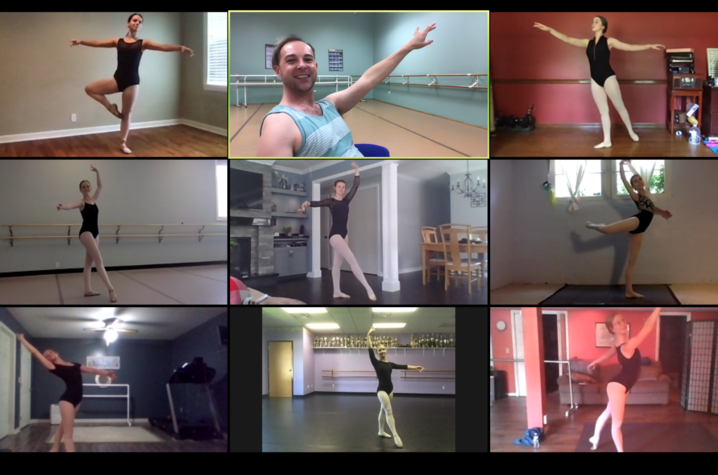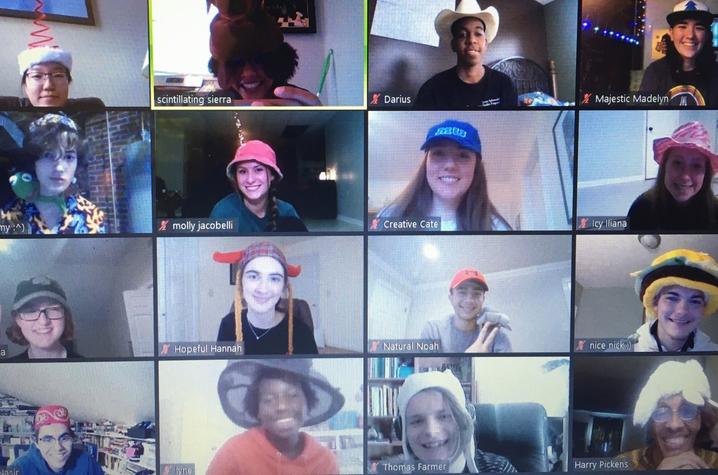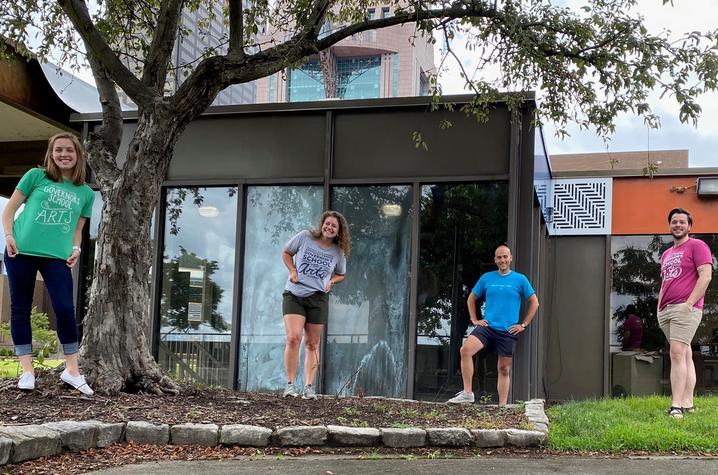The Show Must Go On Online: Governor’s School for the Arts Showcases 2020 Students’ Completed Work Virtually
LEXINGTON, Ky. (July 15, 2020) — For Kentucky’s Governor’s School for the Arts dropping the curtain on its 2020 students was not an option — global coronavirus pandemic or not. And as this summer’s three-week immersive arts education draws to a close this weekend, GSA will give the public an opportunity to celebrate much of its students’ work virtually.
Since 1987, more than 6,400 young rising high school juniors and seniors have descended on a college campus setting to immerse themselves in an arts intensive environment, with cross-discipline learning, guest artist performances and lectures, and the opportunity to access college scholarships. Instruction is offered in nine disciplines: architecture and design, creative writing, dance, drama, film and photography, instrumental music, musical theater, visual art and vocal music.
But this summer, instead of welcoming more than 200 of the Commonwealth’s most talented young artists to the University of Kentucky campus, GSA students honed their skills online while staying healthy at home.
To find out how GSA was able to “go on with the show” in such rare circumstances, UKNow caught up with Nick Covault, director of GSA and UK vocal performance and arts administration alumnus.
UKNow: How did your team decide to proceed with GSA online this summer?
Covault: Our decision to go virtual was based in two commitments: the first was our commitment to providing a transformational experience to the young Kentuckian artists who worked so hard to be accepted into GSA. Our 2020 students are deserving of the resources GSA provides (i.e. college scholarships), and society has so much to benefit from their creativity — completely canceling never felt like an option. The second commitment — and the most important one — was our commitment to student safety. Hands-on collaboration and community building are central to the GSA experience, and we eventually realized that accomplishing our goals through virtual means was much safer for our students, staff and faculty than trying to adjust an in-person experience.
UKNow: How long did it take you all to prepare for a virtual format?
Covault: Internally we made the decision to go virtual in mid-April, and we used every single minute until Opening Day on June 29th to fully prepare! Launching GSA is an act of co-creation with our faculty, staff and administrative team, so much of our initial work focused on reassembling and realigning our team toward a new type of summer program. Only after our hearts and minds were on the same page could we begin the actual planning process.
UKNow: What were the biggest obstacles?
Covault: At a standard GSA summer program, we are in a very controlled environment — we know what spaces we will be in, when we’ll be there, and what resources we’ll have available to us at any moment.
Suddenly, we found ourselves in the opposite situation — how did we know if our students had reliable Wi-Fi, much less room for a ballet class or access to art supplies at home? Like the artists we are, though, we simply adapted. We minimized mystery by surveying students about their technology, workspace, access to supplies, and more.
We shifted lesson plans. We created materials and webinars specifically for parents so we could rely on their buy-in and support. And in the case of our Visual Art program, we ensured every student received an identical box of GSA art supplies, so everyone was creating with the same resources and materials.
UKNow: What does a day look like for a GSA student this summer?
Covault: The entire school attends the same webinar at the beginning of each day, featuring a guest artist presenter/performer (very similar to how we start each day at a standard summer program). This all-school webinar includes a Q&A with the artist, as well as announcements, celebrations (like birthdays) and a daily “challenge” that aligns students in a common experience, even though they’re scattered across the state.
From 11 a.m. to 5 p.m. EST students are in some kind of instruction for their specific artform, which can include panels/lectures from guest artists, participatory workshops, or self-led work individually or in small groups.
Students end their day with a virtual “RA meeting,” where they informally connect and build community with other GSA students under the guidance of a college-aged mentor who would’ve otherwise been living in the residential halls with the students. There are some optional activities organized by RAs on weekends/evenings, such as the legendary GSA “Coffeehouse” — a GSA tradition and the most amazing student talent show you’ve ever seen.
UKNow: How has going online impacted GSA?
Covault: This time of uncertainty and pivoting has required us to deeply reconnect with the values, goals and heart of GSA. I often rely on examples in nature; at first, losing the residential and in-person components of our program reminded me of a big beautiful plant being cut down to its base. We had to reconnect with our roots and grow the virtual summer program from there. Plants often grow back stronger a second time. Nature finds a way, and so did we. GSA will emerge from this summer even more resilient, fearless and self-aware than before.
UKNow: Have there been any pleasant surprises from the virtual experience?
Covault: The students of GSA 2020 have coalesced into a vibrant, caring and connected community with more ease than I could’ve imagined. I suppose I shouldn’t be so surprised, as they’re digital natives who have spent more time building community in virtual spaces than any of GSA’s faculty or staff. Regardless, it has been amazing to see how their personalities, artistry and bonds with each other have radiated through every webinar and Zoom meeting.
UKNow: Do you think it was important to continue GSA this summer, even if it had to be virtual?
Covault: There was never an option not to continue GSA, in my mind. How could we empower our students to embrace the skillset of an artist — resilience, adaptability, innovation, etc. — if we didn’t model those exact qualities by figuring out how to pull off a virtual program? We are artists, and this was nothing more than an opportunity to turn a blank canvas into something beautiful. Beyond that, we asked ourselves “what can we create *because* of this opportunity?” as opposed to the less productive question of “what can we create *in spite* of this opportunity?”
UKNow: Is the students' work reflecting the times (pandemic, the Black Lives Matter movement, etc.)?
Covault: Absolutely — and one of GSA’s greatest gifts is that our students get to learn how other young Kentuckians are reflecting on and responding to the times as well. Our community of artists is a mix of diverse people, identities and perspectives — and that’s by design, as we learn best when we learn from people who are different than ourselves.
We want every GSA student to leave the program with an understanding of how their art can connect to the world they live in — as well as an understanding of what they can take back to their community as an artist. We challenge our students to not settle for being passive creators, but rather to be engaged artist-citizens.
UKNow: What do you hope GSA students take away from this year's experience?
Covault: That they are powerful, important, talented, needed, cared for, capable and wonderful. And that the best is yet to come.
UKNow: What will you take away from this year's virtual experience?
Covault: When humans are intent on connecting with one another to create something bigger than themselves, literally nothing can hold them back. Not a computer screen. Not a pandemic. People are strong, artists are magic and the impossible is impossible until you decide it isn’t.
For the general public, images and recordings of student work will be available on the GSA website www.kentuckygsa.org for the coming weeks. GSA supporters, alumni and family are also invited to “attend” the program’s virtual graduation via livestream on the GSA Facebook page 5:30 p.m. EST Friday, July 17. In addition, check out GSA’s Facebook page for livestreams of some performances and/or virtual galleries as the program ends July 17.
GSA is a public/private partnership inaugurated in 1987 by The Kentucky Center (now Kentucky Performing Arts), The Commonwealth of Kentucky and numerous private supporters. Today, the vital funding required to make GSA a reality is provided by the state through the leadership of the Governor’s Office and the Kentucky Tourism, Arts and Heritage Cabinet, as well as The Kentucky Center Endowment Fund, Toyota Motor Manufacturing and more than 300 corporations, parents, educators, alumni and friends of GSA.
The mission of Kentucky Performing Arts is to build lifelong relationships with the arts. As an integral member of the Kentucky Tourism, Arts, and Heritage Cabinet, Kentucky Performing Arts, along with the other agencies, seeks to preserve and promote the history, heritage and arts of the Commonwealth.
As the state’s flagship, land-grant institution, the University of Kentucky exists to advance the Commonwealth. We do that by preparing the next generation of leaders — placing students at the heart of everything we do — and transforming the lives of Kentuckians through education, research and creative work, service and health care. We pride ourselves on being a catalyst for breakthroughs and a force for healing, a place where ingenuity unfolds. It's all made possible by our people — visionaries, disruptors and pioneers — who make up 200 academic programs, a $476.5 million research and development enterprise and a world-class medical center, all on one campus.







